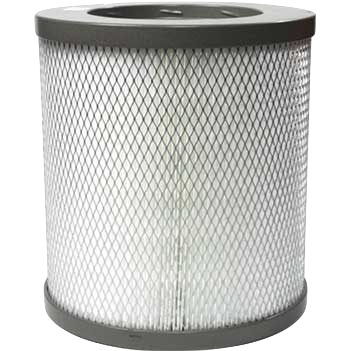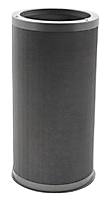What’s in a HEPA Filter?
HEPA air filters for whole-home applications have made big strides in recent years and our team at Save Home Heat Company now recommends these products for installation in a wide variety of types of homes – not just those heated by a forced air furnace.
In this post, we’re going to take a closer look at the filter components used in these state-of-the-art filter systems, focusing on the Healthy Climate High-Efficiency Particulate Air (HEPA) Filtration System from Lennox Industries that we install regularly for our customers.

What’s a HEPA Filter and Why Should You Consider One?
HEPA filters are, in short, highly efficient air filters that incorporate several dense layers of filtering media in a central filter element, along with other internal filters. The Lennox system contains a 3-stage filter design. Whole-home HEPA filters are housed in a heavy gauge, painted, steel housing that also contains an internal fan whose sole purpose is to move air through the filter media.
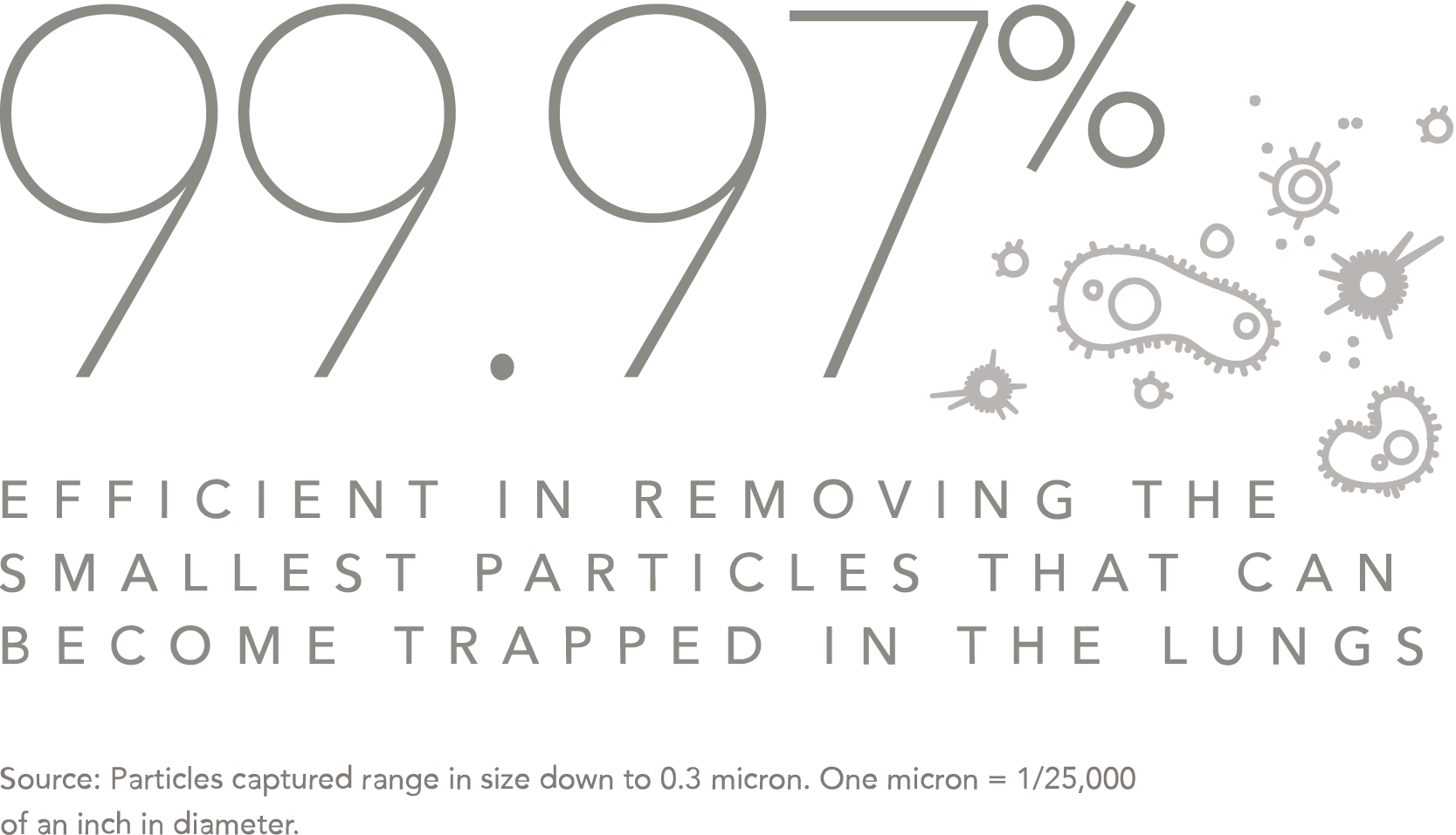
The HEPA Filtration System from Lenox removes 99.97% of all particles 0.3 microns in diameter and larger (1 micron = 1/25,000th of an inch), and carries an efficiency rating of MERV17+. The “plus” sign reflects the fact that HEPA filters are actually assessed differently than the MERV11 and MERV16 inline media filters that our team installs regularly. In reality, they perform well beyond the ratings of those popular high performance furnace filters.
The benefits of a whole-house HEPA filter Include:
- Cleanest indoor air achievable
- Can reduce airborne allergy triggers and symptoms from asthma and other respiratory conditions
- Reduces spread of certain airborne viruses and bacteria
- Promotes better rest and sleep
- Improves efficiency and effectiveness of furnace, heat pump, and AC systems, providing greater protection for heat exchangers, evaporator coilers, blowers, and more
- Can help extend the lifespan of furnace, AC, and heat pump systems
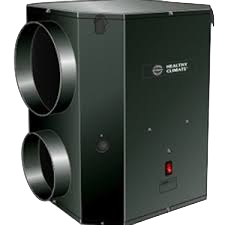
These highly effective air filtration systems can be installed in homes with or without an existing central ducting system, including those that are heated by a boiler or a mini-split heat pump. In these latter cases, where some new ducting will need to be installed, this assumes that the home’s layout will accommodate this option. Our team at Save Home Heat has had good luck coming up with solutions that work in many different types of homes!
The 3-Stage HEPA Filtration System from Lennox
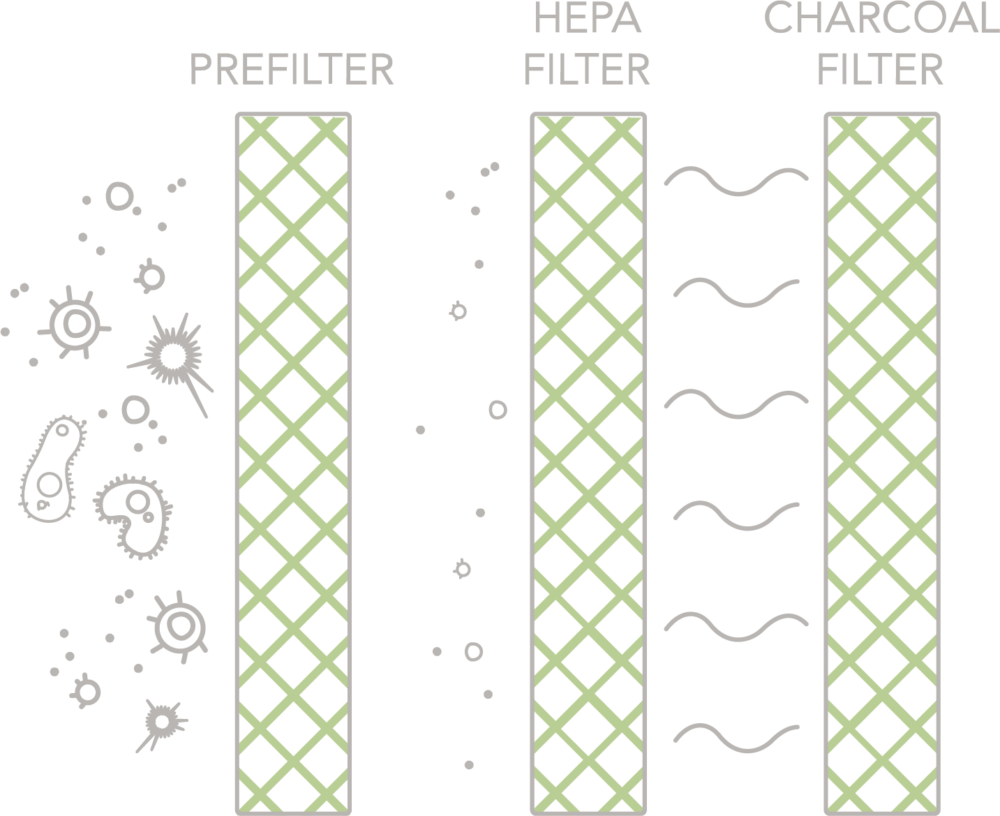
The Lennox HEPA Filtration System includes a prefilter, the central HEPA filter, and a charcoal inner/post-filter. Here’s a closer look at these three replaceable filter components.
Stage 1: Prefilter
This is a low-resistance, activated carbon-impregnated prefilter made of proprietary synthetic fibers. The prefilter is designed to capture larger particles, assist in odor control, and help extend the life of the HEPA filter element in the system. Lennox recommends replacing the prefilter every 12 months.
Stage 2: HEPA Filter
Not surprisingly, this is the heart of the HEPA filter system, where the efficiency rating of the filter and superior air filtration is accomplished. The Lennox HEPA filter media consists of a V-shaped, deep-pleat filter that’s constructed of high strength, sealed, water-resistant, graded density, antioxidant-treated, microfiber paper (try saying that three times fast!). The filter is contained in an easy-to-replace housing.
The pressure drop/resistance to airflow through this filter element is such that the HEPA system requires its own internal fan (mentioned above) in order to properly circulate air through the HEPA filter. The main blower in a furnace or air handler, whose job is to circulate air to the home, is not adequate to maintain proper airflow through the HEPA media while also delivering air to all parts of the house. This is the nature of whole-home HEPA filters: the internal fan in the HEPA housing circulates household air through the filter while the main furnace or air handler blower simultaneously recirculates air around the home. The estimated lifespan of the HEPA filter is 2-5 years.
Stage 3: Activated Carbon Inner/Post-Filter
The third-stage filter is also made of proprietary, non-fiberglass synthetic fibers. It is relatively low-resistance (similar to the pre-filter) and is designed to remove odors and airborne chemicals. While the estimated lifespan of this filter is stated to be 3-6 months, Lennox recommends replacing it when “effectiveness drops.”
A popular post-filter upgrade, Lennox offers an optional, heavy duty, granular carbon, coconut shell canister third-stage filter. This option provides a longer lifespan and improved activated carbon effectiveness; it also effectively removes ozone from your air. The lifespan of this filter is 6-12 months, or when effectiveness drops off.
A Note About Filter Lifespan
The estimated lifespan of the above filter components will vary depending on several factors, including how consistently the system is being used and the nature of the home and the air that’s being filtered. For example, in a home with a couple of pets, lots of kids, and plenty of indoor activity, you can expect filter replacements to be needed more often than, say, a home occupied by 2 or 3 persons who are gone a lot.

Replacement intervals can range in either direction, longer or shorter. The guidelines provided by Lennox and other manufacturers for their products are estimates only, and real-time use will help determine the proper filter replacement schedule for each particular family and home.
Taking Your IAQ To the Next Level
 In order to achieve the cleanest indoor air in a home, the ideal companion for a HEPA air filter is a whole-home air purifier, which complements the HEPA system by neutralizing substances that not even a HEPA filter can catch. A high quality central air purifier – ask us about the REME HALO – is capable of killing a high percentage of a wide variety of air- and surface-borne bacteria and viruses, and neutralizing an equally broad range of airborne, gaseous chemicals and VOCs (volatile organic compounds). In high enough levels, many of these substances can negatively impact your health, not to mention your comfort.
In order to achieve the cleanest indoor air in a home, the ideal companion for a HEPA air filter is a whole-home air purifier, which complements the HEPA system by neutralizing substances that not even a HEPA filter can catch. A high quality central air purifier – ask us about the REME HALO – is capable of killing a high percentage of a wide variety of air- and surface-borne bacteria and viruses, and neutralizing an equally broad range of airborne, gaseous chemicals and VOCs (volatile organic compounds). In high enough levels, many of these substances can negatively impact your health, not to mention your comfort.
In addition, a central humidifier can have a significant impact on improving your indoor air quality (IAQ) during the heating season. The benefits of proper indoor humidity levels are many. And for homes that are fairly tight and energy efficient, it may make sense to learn about the benefits of incorporating an energy recovery ventilator (aka. a fresh air ventilator) with your home comfort system.
Expert IAQ Solutions for Your Boulder-Denver Home
 Nearly every home and family is unique in one respect or another, and our team at Save Home Heat Company offers recommendations tailored for each home and owner that we work with. There can be quite a bit to learn and take into consideration, and we urge you to take your time, ask lots of questions, and find the solution that’s best for your situation.
Nearly every home and family is unique in one respect or another, and our team at Save Home Heat Company offers recommendations tailored for each home and owner that we work with. There can be quite a bit to learn and take into consideration, and we urge you to take your time, ask lots of questions, and find the solution that’s best for your situation.
Please reach out to our team to learn more or to schedule a highly informative, low-pressure, free install quote for a whole-house HEPA air filtration system for your Boulder-Denver metro area home.
Please contact me to schedule an air filter upgrade quote for my home!

